Can Australia live up to AUKUS partners’ trust?
The Albanese government now seeks to stabilise bilateral relations with China while embarking on a partnership with the US and regional nations in a strategy to deterrence against China – a challenging brief.
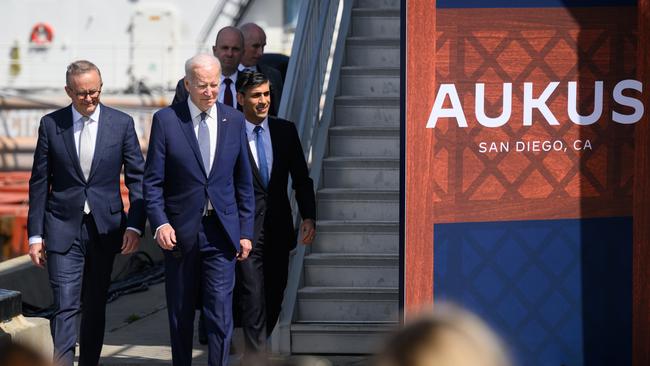
This week in San Diego, California, Biden turned AUKUS into a pivotal instrument of his foreign policy, the purpose being to strengthen US alliances in a more dangerous Indo-Pacific region.
The sense of ownership of AUKUS, political and strategic, was the ultimate meaning of the week with each of the three leaders – Biden, British Prime Minister Rishi Sunak and Anthony Albanese – leaving with electoral gains and shared submarine commitments. Australia is the most important beneficiary because the central purpose is to take Australia into another strategic league as a nuclear-powered submarine country, the seventh in the world.
AUKUS is loaded with risks but the opportunities it offers are unique and unparalleled in Australia’s history.
Fundamental to this week’s outcome was the pressure Labor Defence Minister Richard Marles applied to the submarine taskforce headed by Vice-Admiral Jonathan Mead to work with the US and address the submarine capability gap Australia faced – with the delivery of the Virginia-class being the answer that was forthcoming.
Peter Dean, from the US Studies Centre at the University of Sydney and a principal author of the upcoming Defence Strategic Review, told Inquirer: “This is an extraordinary decision by the United States. It means we are not just getting the technology; we are getting the boat.
“The decision to sell Australia Virginia-class submarines is massive. When I first heard about this I assumed it would be a lease or a loan. No, we are buying them. They will become sovereign Australian boats. And we are getting this capability 10 years earlier than previously expected.
“Virginia-class submarines are the crown jewels of the US Navy advance undersea military technology. They are some of the most sensitive and secret military technology on the planet.
“This shows exceptionally high confidence by the US in Australia and our ability to maintain secrecy, develop nuclear stewardship and operation expertise.”
Much debate in Australia since the Trump presidency has been whether Australia can trust the US as a senior alliance partner – but AUKUS has turned this question on its head. From this week the new question becomes: can Australia live up to the trust and obligations America has imposed on us by selling its Virginia-class from the early 2030s?
Albanese and Marles have won a historic breakthrough on the AUKUS project. They have built on Scott Morrison’s epic achievement in securing AUKUS by now locking in the purchase of the US Virginia-class. Few observers believed this possible. The US decision further extends its influence into the heart of Australia’s maritime power.
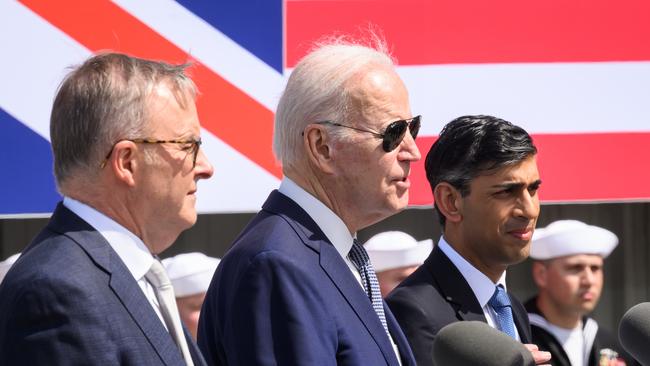
Australia has been lucky with Biden. While initially cautious in 2021, Biden has become a champion of AUKUS, with his administration and the Albanese government finding wide common ground. But the US Virginia-class initiative presents a mammoth challenge.
It means Australia must meet the standards that will be demanded to manage the US submarine – in terms of workforce skills, a new class of trained sub-mariners and nuclear regulatory oversight. It means Australia must entrench political bipartisanship for the project and Labor must commit for years to the most substantial industrial project in our history. This will change Australia as a country.
Above all, it means Labor must embrace the transformation in its values and outlook as a party that this represents – nuclear propulsion, deeper military and technological integration with the US and Britain, and a long-term strategy of deterrence of China at distance from the Australian continent in association with the US and regional allies.
In addition, the US told Australia that building Virginia-class boats in Adelaide was not an option. This shaped the second defining phase of the plan, the development of an Australian nuclear submarine construction industry. It is being realised in the joint British-Australian build of a British-designed conventionally armed, nuclear-powered submarine, SSN-AUKUS, produced in shipyards in Britain and Adelaide and equipped with a US combat system. It is agreed that Britain, given its experience, will lead the process. Britain will deliver its first boat in the late 2030s and Australia’s will come in the early 2040s.
Defence Industry Minister Pat Conroy said Australia was not building the first type of this class – that will be built in Britain and the first Australian boat delivered a half-decade later. That’s prudent. Across the life of the project Australia will spend about $30bn to uplift the capacity of Australian industry and workforce.
Significantly, Australia is pledged to a financial investment of about $3bn to support both the US and British submarine industrial base. For the navy, having two different submarines will be a challenge. But suggestions that Australia should just buy more Virginia-class boats and forget the British-designed boat are nonsense. More Virginias are not available; the US must meet its own demands. As Marles said, there is “no magic showroom” of Virginias to pick off the shelf.
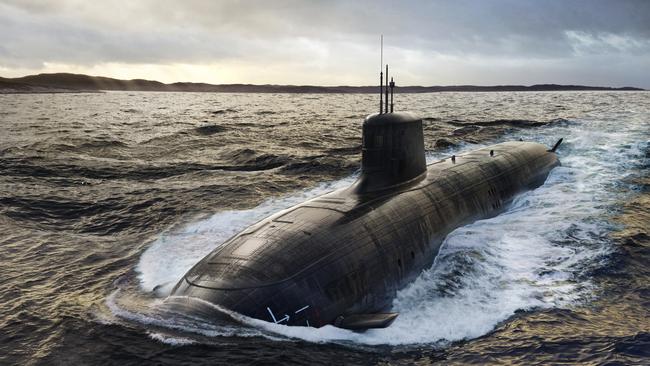
The entire purpose of AUKUS was to develop an Australian nuclear submarine construction facility given the breakthrough decision of the US and Britain to provide their nuclear technology. The objective has been to avoid Australia’s new submarine being an orphan – produced only in this country, with maximum risk to cost and timetable. This is the beauty of the three-way AUKUS deal. The test was always whether the in-principle agreement sealed in 2021 could be turned into a workable partnership, and this week’s announcement offers a tangible blueprint.
On display is a critical evolution in Australia’s alliance systems; this is a step towards deeper technological, inter-operational and integrated systems with the US and Britain and aligns Australia far more deeply with the American-led regional strategy of deterrence against China’s military ambitions.
For Labor, cost and conviction are the heart of this arrangement. Albanese, Marles and Mead have exceeded expectations in these three-way announcements. When the Labor leadership signed up to AUKUS in 2021 under electoral pressure there was always a doubt: was this expediency or belief? That question is now answered. This is a declaration of Labor belief.
Albanese, Marles, Foreign Minister Penny Wong and Jim Chalmers constitute an impressive ministerial and factional quartet to mount the political case and supervise this Australian transformation – from buying the Virginia-class to building nuclear-powered submarines in Adelaide to constructing a facility for nuclear reactor disposal.
Labor in government always needs grand projects to sustain its purpose. This will be a grand project. Paul Keating’s massive assault on the agreement guarantees there will be Labor dissidents. But the early unity of the Albanese government and the caucus around the evolving AUKUS concept is impressive.
The government has been conservative about the costs. Marles and the Treasurer say the lifetime cost will be 0.15 per cent of GDP with the current defence budget about 2 per cent of GDP and rising to about 2.2 per cent. As Marles said, for the capability, that’s modest. It is surely an under-estimate, given the history of defence projects. The government accepts that defence spending across time must increase beyond 2.2 per cent of GDP.
Defence has been squeezed in the near term. Across the first four years of forward estimates the cost is only $9bn and is completely offset by $6bn in savings from the abandoned French project and $3bn in savings from the defence budget. Across the opening 10 years the cost is only $50bn-$58bn, and that compares with $254bn for the stage three tax cuts. But long-run defence costing is near guesswork.
For Labor, AUKUS becomes an existential issue. “This is an investment we can’t afford not to make,” Marles said. “Australia can’t afford not to do this,” Chalmers said. This invests the project with a sovereignty essential status. Does it only deepen Labor’s fiscal woes? Yes, of course. Does it mean higher taxes are even more certain? Yes. Can we expect the Peter Dutton-led opposition that backs the project to intensify its economic attack on the government? Yes.
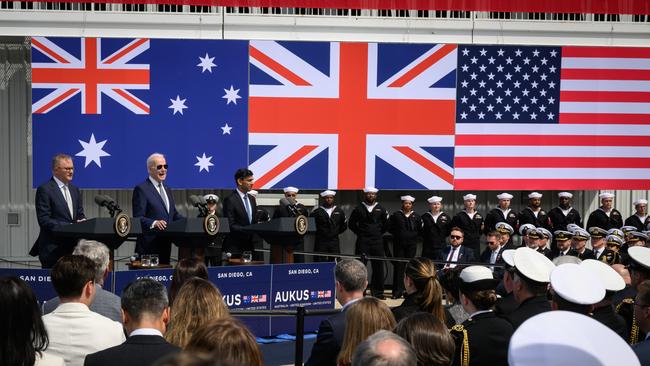
The immediate political omens for AUKUS are encouraging. There is bipartisan support in the US, Britain and Australia. Cross-party support for Australia in the US congress remains strong. Recent polling conducted by the US Studies Centre under chief executive Mike Green showed that ahead of the US midterm elections the number of Americans who saw their alliance with Australia as making the US more secure had increased from 44 per cent in 2021 to 58 per cent last year. This suggests a more subtle view of alliances from the American public. Where allies are seen to be carrying their share of the load, public support is rising – and Australia seems to fit that category.
In his remarks Biden alluded to the momentum AUKUS had generated: “You know, when our countries first announced AUKUS 18 months ago, I’m not at all sure that anyone would have believed that – how much progress we’d be able to make together and how quickly we’d accomplish it.”
US National Security Adviser Jake Sullivan told the media: “If Ronald Reagan’s formula was ‘peace through strength’, Joe Biden’s formula is ‘peace through American and allied strength’. President Biden has talked often and feels very strongly about connecting our allies in the Atlantic and our allies in the Pacific. That is AUKUS at its heart.”
Beginning this year there will be increased visits of US submarines. From 2027 there will be a rotational presence at HMAS Stirling near Perth involving up to four US Virginia-class and one British Astute-class submarine.
The Virginia-class purchases, subject to congressional approval, will then occur each three years from about 2033. The purpose is to deliver Australia a new submarine capability at speed. Sullivan told the media: ”To the extent that AUKUS places additional requirements on that industrial base, the Australians are picking up the bill.”
Mead confirmed that a priority from the start for the 18-month review team had been the direct instruction from Marles to ensure there was no ongoing capability gap. The infrastructure investment required by Australia to allow construction at Adelaide will be immense.
“This represents the biggest leap in our military capability since the end of the second world war,” Marles said. “Arguably, it’s the biggest leap in our military capability in our history.” He put the core motivation on the table, saying of China without naming China: “We are witnessing the biggest conventional military build-up that we have seen since the end of the second world war. And it’s happening within our region. And it is not Australia which is doing that. And we need to respond to this. A failure to do so would see us be condemned by history.”
The US and Britain will provide Australia with nuclear material in complete, welded power units that will not require refuelling during their lifetime. In this sense, Marles said, “a sealed nuclear reactor is our friend”. A non-negotiable condition for Australia has been compliance with our obligations under the non-proliferation treaty. Australia has offered assurances that it does not – and will not – seek to acquire nuclear weapons. Australia’s commitment to managing all radioactive waste generated through the program, including spent nuclear fuel, is fundamental to its acceptance of nuclear stewardship.
It is surely correct, however, that domestic political acceptance of AUKUS has been assisted by the 2022 change of government. The critics must deal with Albanese and Marles, not Morrison, who had become a political punching bag but now enjoys his standing as initiator of the AUKUS concept.
The key to Australia’s AUKUS politics lies in China’s behaviour. It is China that has driven this revolution in our strategic policy. Its assertion and coercion produced a pushback from Morrison that culminated in AUKUS and also saw a deepening of Labor’s maturity on security issues.
The Albanese government now seeks to stabilise bilateral relations with China while embarking on a partnership with the US and regional nations in a strategy to deterrence against China – a challenging brief.
In Biden’s statement he said America stood at a point where “enhancing deterrence” and “promoting stability” would shape the Indo-Pacific for future decades. He said the AUKUS partnerships were “really consequential” in this project along with the overlapping Quad – the US, Japan, Australia and India. The US has a long history as a Pacific power and that history still has a long way to run.


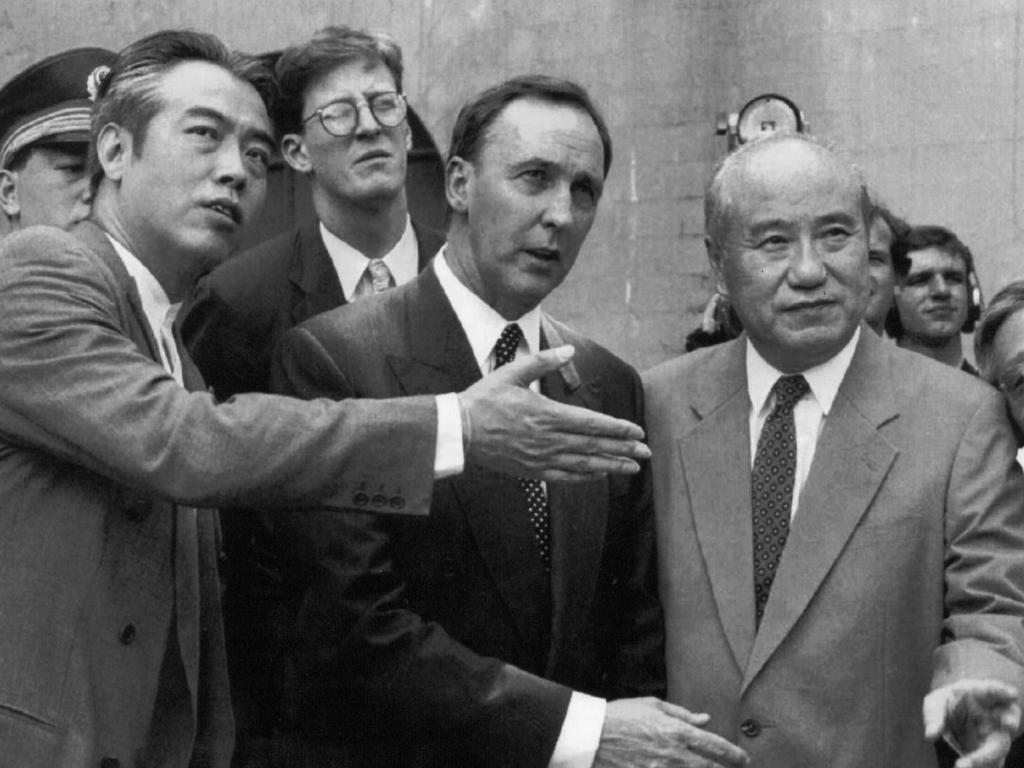
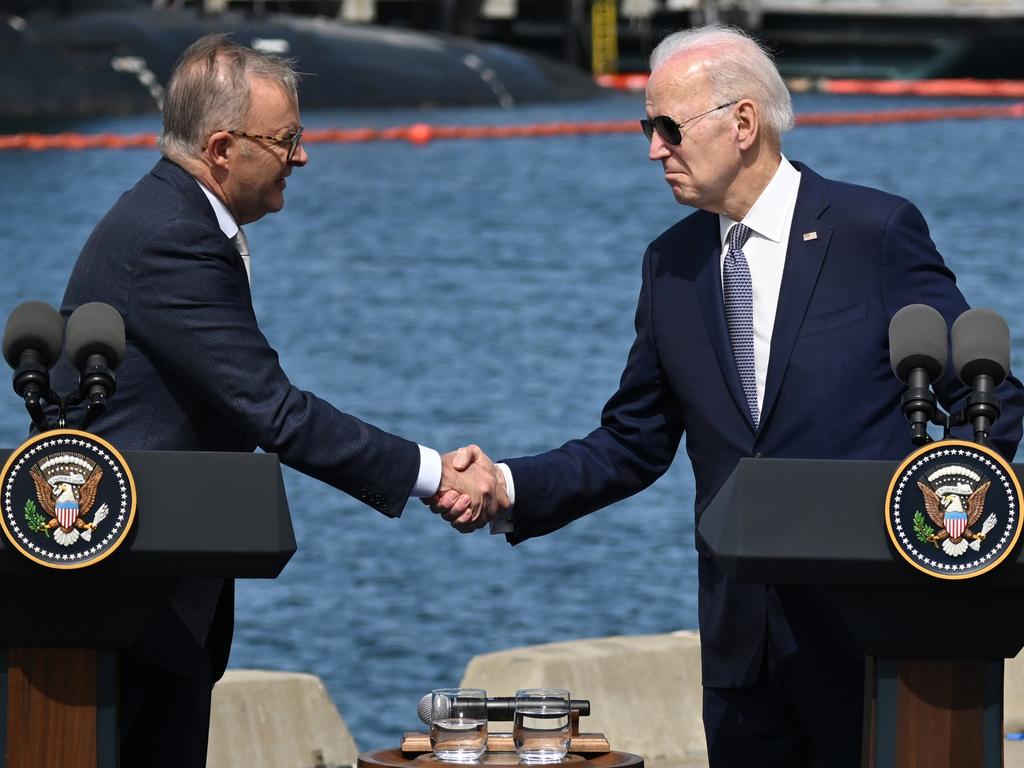
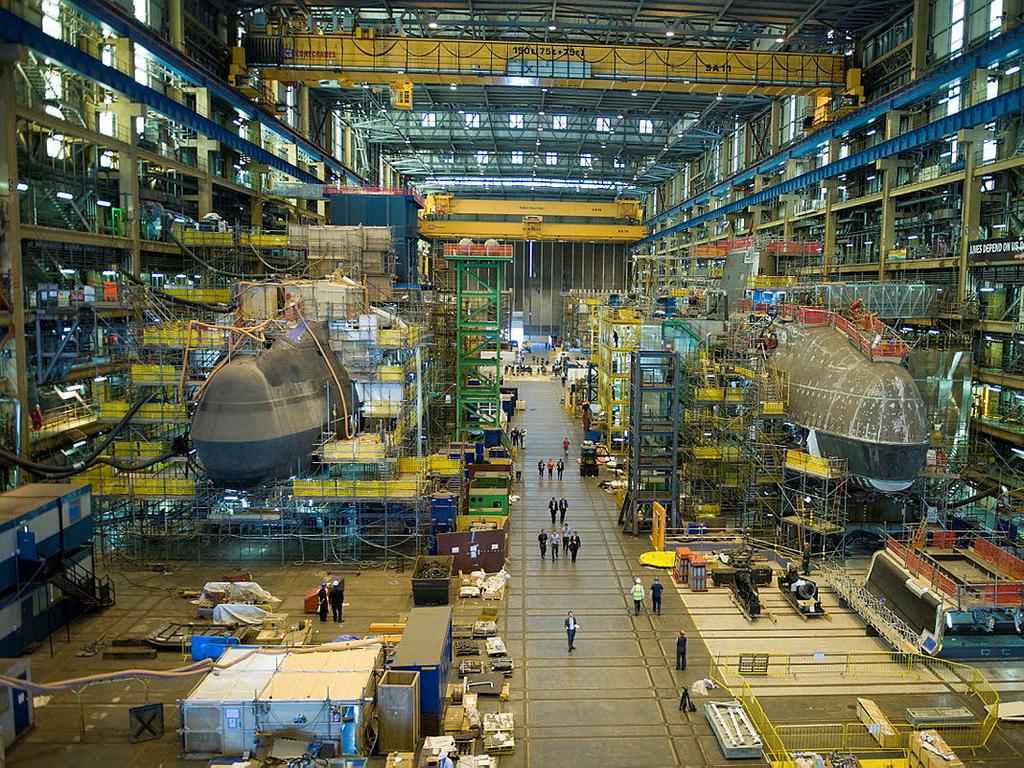
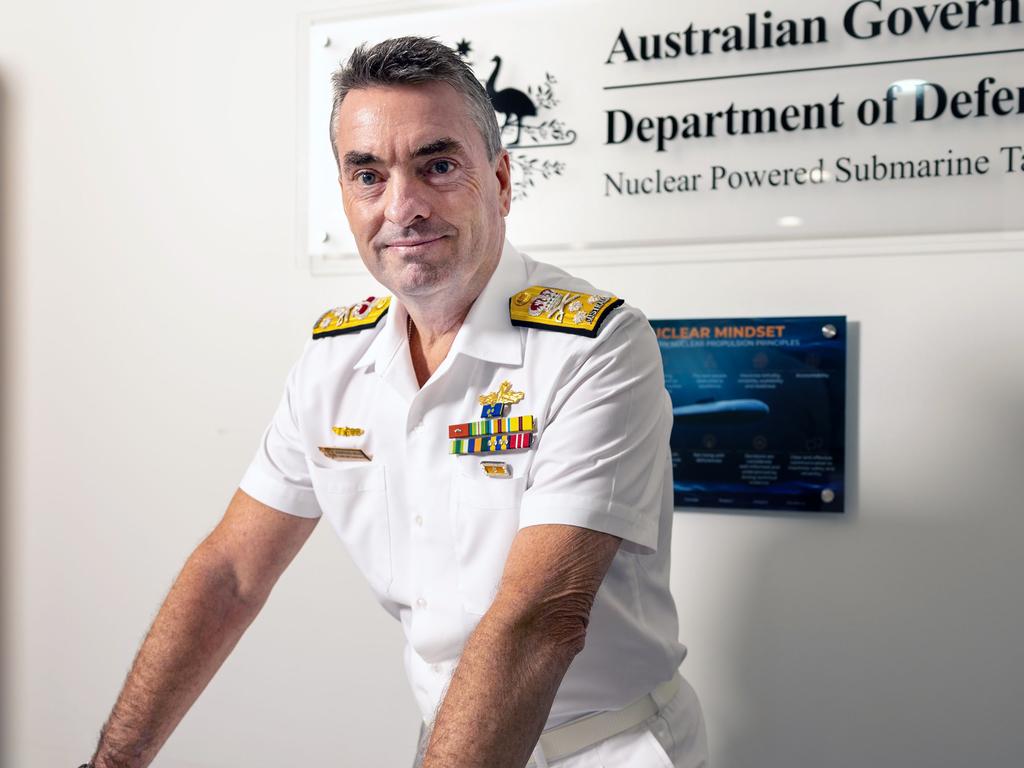
It was US President Joe Biden’s vision and pressure from the Albanese government that have delivered one of the most remarkable pledges in the history of Australian-American relations – the US decision to sell three, possibly five, of its prized Virginia-class nuclear-powered submarines to Australia. This was a presidential judgment and follows Biden’s initial decision in 2021 to authorise AUKUS.